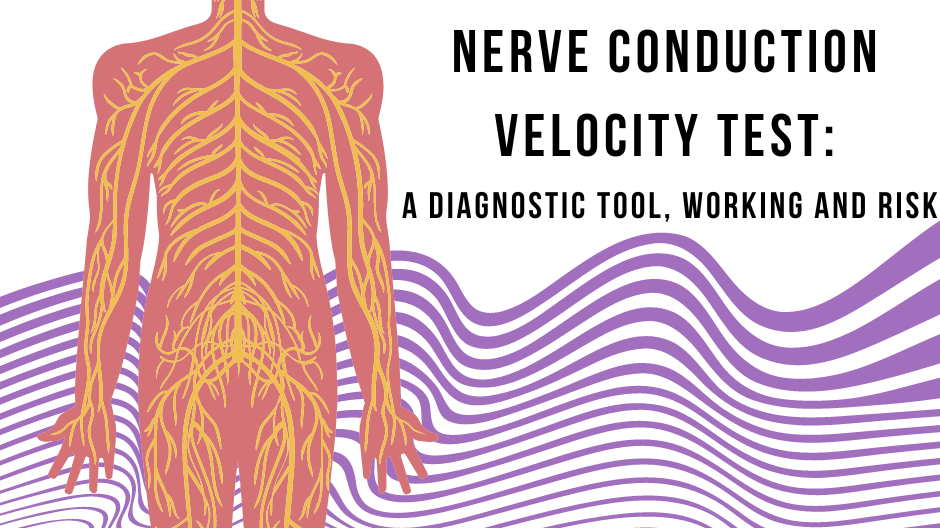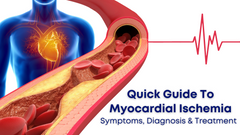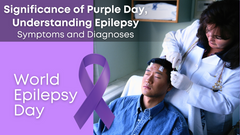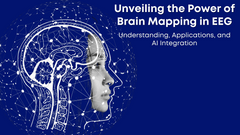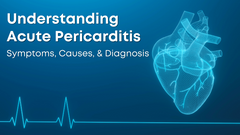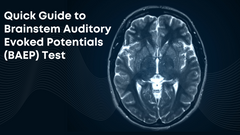Nerve conduction velocity test (NCV): a Diagnostic tool, Working and Risk
A nerve conduction velocity test determines how quickly electrical impulses travel through the body's nerves.
Learn about the nerve conduction velocity, or NCV, test's application, typical outcomes, and potential adverse effects in this article.
NCV as a diagnostic tool
An NCV test is used to check for nerve injury. An electrical current is used to directly stimulate a nerve during the test to observe how it responds. A range of muscular and neuromuscular diseases can be diagnosed with NCV tests.
In some cases, electromyograms, often known as EMGs, are performed along with NCV tests. EMGs are also used by doctors to help identify neurological or muscle illnesses.
An EMG can identify whether a person has a muscle issue or a nerve disease by assessing how well a muscle reacts to nerve impulses.
Using an NCV test, the following conditions can be identified:
Herniated disk disease
The term "herniated disk disease" describes issues with the disks or rubber cushions between the vertebrae (The various bones that make up the spine are known as vertebrae).
Herniated disks can irritate adjacent nerves and result in discomfort, numbness, and weakness in the arms and legs. Although they can also affect the cervical spine, herniated disks typically affect the lumbar spine (lower back) (the neck).
Sciatica Nerve Problems
Sciatica is a condition that affects the sciatic nerve (the largest nerve in the human body). From the lower back, the sciatic nerve travels down both sides of the hips, buttocks, legs, and feet. Herniated disks in the low back and low spine are typically associated with sciatic nerve discomfort. 42 percent of individuals in one study with sciatica also reported back pain. 68 percent of people with back pain also had herniated disks.
Herniated disks and sciatic nerve pain frequently coexist because pressure is placed on the surrounding nerves when disks in the lower spine and back move out of place.
An NCV test can be used to identify sciatic nerve compression or injury. Additionally, it can identify any issues with the nerve itself.
Using NCVs and EMGs, it is possible to identify the source of sciatic nerve discomfort, such as a herniated disc.
Peripheral Neuropathy
According to the National Institute of Neurological Disorders and Stroke, peripheral neuropathy affects at least 20 million people in the United States.
Peripheral nerves are in charge of transmitting data from the brain and spinal cord to the rest of the body and the other way around.
People who have peripheral nerve injury may experience pain, numbness, and weakness in their hands and feet. Although these are the most typical places for symptoms to appear, they can also appear in other places.
The severity of the nerve fibre injury can be determined using NCV testing.
Carpal tunnel syndrome
The median nerve, which travels from the forearm into the hand, becomes compressed at the wrist, resulting in carpal tunnel syndrome (CTS).
Numbness, tingling, and discomfort in the thumb and fingers that may radiate into the arm are signs of CTS. CTS has the potential to cause nerve damage over time, which would impair one's ability to grasp or retain objects.
A doctor can choose the best course of treatment with the aid of an NCV test, which can assess nerve function in the median nerve.
Guillain-Barré syndrome
An autoimmune condition known as Guillain-Barré syndrome (GBS) is brought on when the body's immune system assaults certain peripheral nervous system tissues.
Weakness and tingling in the legs are the initial symptoms of GBS. Although recovery from GBS is lengthy, the majority of patients make a full recovery. However, the most severe cases could result in paralysis and impairment.
A NCV test can assist in identifying GBS. Electrical transmissions along GBS-affected nerves move more slowly than normal.
How to prepare for NCV/EMG test?
The physician doing the NCV test will walk the patient through the process and provide an opportunity for questions.
People may need to do the following in order to get ready:
>For a few days previous to the test, refrain from applying lotions, oils, fragrances, or other products to the skin.
>Inform their doctor about any current medications they are taking, including dietary supplements and over-the-counter painkillers.
>Wear loose clothing or layers that can be taken off.
>Let the doctor know if you have a cardiac defibrillator or pacemaker.
An NCV test doesn't involve anaesthesia or fasting, but some people might need to take extra measures based on any current medical conditions they may have.
What to expect?
NCV diagnostics are often performed as outpatient procedures, thus a hospital stay is not necessary.
A doctor will instruct a patient before the procedure to:
>Take off any jewellery, eyeglasses, hairpins, or other metal objects that can interfere with the test.
>Put on a hospital gown.
>Sit or lie down, depending on the body part being tested.
When the patient is prepared, a medical professional will identify the nerves and place a recording electrode on the skin just above the nerves.
Then put a second electrode at a nearby location. To stimulate the nerve, this second electrode will deliver a gentle, momentary electric shock. Although it shouldn't hurt, it could feel a minor discomfort. Once the test is through, there won't be any more discomfort.
A monitor will show the stimulation and the nerve reaction for the doctor to record.
After the NCV exam, a person might have to have an EMG test. In order to examine the function of the muscles during an EMG test, needles are inserted into the muscles. The needle sites may become sore and bruised as a result, which can be irritating.
Are there any risks?
In NCV testing, very little voltage is applied, and there are very few dangers. However, it is imperative to go over any worries with the physician ordering the treatment.
When undergoing an NCV test, those who have pacemakers or cardiac defibrillators may need to take extra measures.
The findings of the test could also be impacted by other variables, such as discomfort before the operation and body temperature.
Results
NCV tests are able to gauge the velocity and power of nerve signals. Normal nerve conduction velocity is between 50 and 60 metres per second.
A damaged nerve could communicate more slowly and weakly than a healthy one. Even if a person has nerve injury, normal results are still attainable.
Anyone concerned about their NCV test results should speak with a doctor for individualized diagnosis and treatment.
For Doctors and medical staff looking for EMG/NCV devices, Clarity Medical is a medical device manufacturer and has created World's smallest EMG device which is portable enough to carry in a laptop bag and weighs less than 120 grams.


